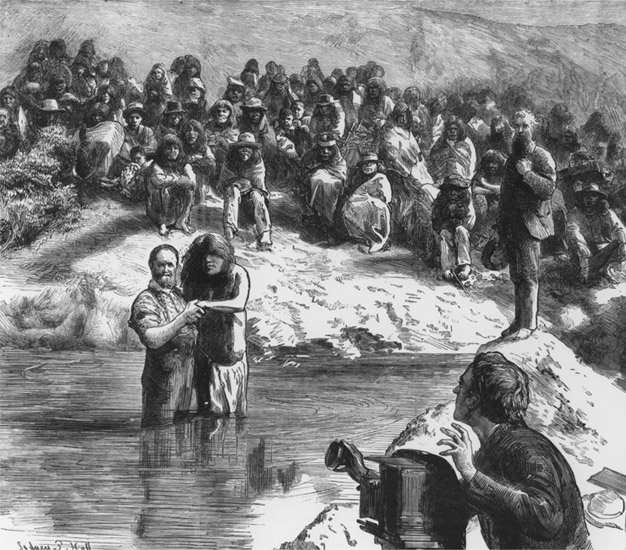
Christianity and trade have always gone hand in hand, with missionaries—like these Mormons baptizing Native Americans in the late nineteenth century—often preparing the way for merchants by pacifying native peoples. (Library of Congress)
A religion that was originally an offshoot of first-century Judaism.
Christianity, a monotheistic and highly moralistic religion spread first through the Mediterranean world, then through most of Europe and from there, largely after the fifteenth century, through much of the rest of the world.
Christianity has always been a proselytizing religion, charged with spreading the Gospel (“Good News”) that Jesus is the Lord and Savior of humankind and baptizing converts. Missionaries have often spread this message along trade routes, first within the Roman empire and later stretching out in all directions. Because Christianity has been split, virtually from its inception, into major factions (broadly Eastern Orthodox, Roman Catholic, and Protestant) and many smaller denominations, missionaries from different sects have, at times, found themselves competing for the attention of potential converts. Colonialism and imperialism practiced by countries with national or dominant churches allowed for the exclusion of conflicting voices.
Where Christianity held sway, its ideas of morality often shaped important aspects of trade and its contexts. Shunning the material world and its temptations to sin and treating all people as siblings lay at the root of Christian teaching. Churches and individual leaders, to greater or lesser degrees, have frowned on business practices that seem to violate these principles. At various times, usury, excessive profit taking, exploitation of workers, slavery, and trade with un-savory partners have been inveighed against. Some Christians have even held up monasticism, with its rejection of material values, and people who have radically embraced poverty, such as Mother Teresa of Calcutta, Mary of Egypt, and Saint Francis of Assisi, serve as models for the conduct of human life. During the later Middle Ages and Renaissance eras, this monastic or clerical ideal withered before the wealth and comfort in which the Christian world increasingly found itself. With the growth of Protestantism in western Europe in the sixteenth century, participation in economic activity for profit found its champions, especially among the Calvinists, who saw earthly financial success as a sign of Divine favor, rather than as a cause for guilt.

Christianity and trade have always gone hand in hand, with missionaries—like these Mormons baptizing Native Americans in the late nineteenth century—often preparing the way for merchants by pacifying native peoples. (Library of Congress)
As Christianity fractured in Europe, it was spread throughout Europe’s new maritime world of trade and exploitation. Spanish and French Catholic missionaries moved the farthest and fastest, sailing on merchant vessels to every part of their sovereigns’ new realms, while Dutch Calvinists accompanied merchants and government officials from the Netherlands to the Indies, both East and West. Friars and other godly men argued against some of the excesses of the conquistadors. Missionaries educated native peoples in European ways and languages as well as in God’s. On the one hand, by preaching subservience to God and His church and the rulers He put in place, they made ruling and controlling people rather easier. On the other hand, they laid the foundation for greater sophistication among these peoples, and even rebellion. Although the voice of Christian moral authority has become ever more polyphonic, and secular ideals have largely replaced transcendental ones, stances by Quakers and Baptists against slavery in antebellum America, and statements of Catholic popes against maltreatment of laborers and in favor of the “preferential option for the poor” throughout the world are just two from among many examples of the exercise of moral suasion that has shaped the context of economic activity in the world.
Joseph P. Byrne
See also: Missionaries; Reformation; Religion.
Finn, Daniel Rush. Just Trading: On the Ethics and Economics of International Trade. Nashville: Abingdon, 1997.
Gilchrist, J.T. The Church and Economic Activity in the Middle Ages. New York: St. Martin’s Press, 1969.